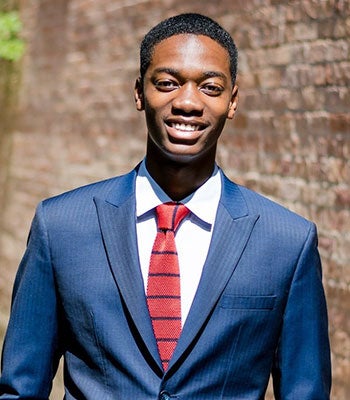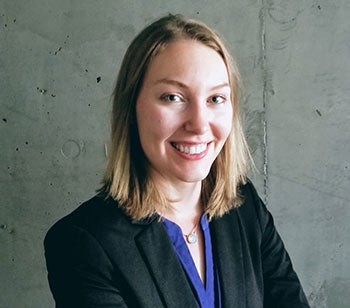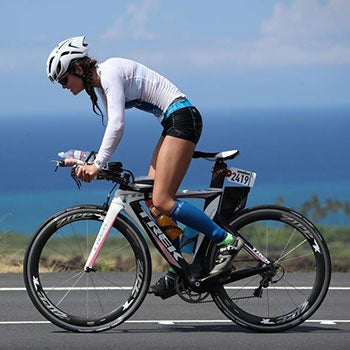The journey to ASU Law: 3 students of the incoming class share their stories

As it continues to raise its profile, the Sandra Day O’Connor College of Law at Arizona State University is attracting elite students from all across the country.
The No. 8 public law school, according to U.S. News & World Report, consistently rates among the best in job placement and bar passage. ASU Law is welcoming a new class of students this fall from more than 40 different states.
Although the common denominator is academic success — the incoming class boasts the highest grade-point average and average LSAT score in the school’s history — their backgrounds and interests are as varied as their geography.
“If you’re a highly motivated student who’s passionate about the law, we don’t care where you’re from — you are welcome here,” said ASU Law Dean Douglas Sylvester. “We have always taken pride in the diverse backgrounds and accomplishments of our student body and believe it is an essential element to the education and experience we offer at ASU Law.”
Three members of the new fall class shared their thoughts on the divergent paths that brought them to ASU Law, and what they hope to accomplish.

Christopher Senn
Law-school student ready for takeoff
From a young age, Christopher Senn had dreams of becoming a lawyer.
“Growing up, I’ve always enjoyed debating,” said the 24-year-old native of Washington, D.C. “As superficial as that sounds — I know that’s not what law will really entail — but I always told myself that I wanted to be a lawyer growing up.”
But he enlisted in the Marines in 2011, and his career took a different flight path. Stationed in Cherry Point, North Carolina, Senn served as a pilot of drones, referred to in the military as unmanned aircraft systems. From there, he enrolled in Embry-Riddle Aeronautical University, graduating in 2015 with a degree in aeronautics. He then got a job in Sierra Vista, Arizona, working for Raytheon, a major defense contractor and the world’s largest manufacturer of guided missiles, and simultaneously began a master’s degree program in unmanned systems at Embry-Riddle, becoming one of the first graduates of that particular program.
After completing his master’s degree, he was recruited to Kansas State University to serve as an assistant professor of aviation and began teaching in the unmanned aerial systems program in 2016.
After teaching two years at Kansas State, he said, he was well-established in his career and had put the thought of law school off to the side. But as he and other colleagues were contemplating advanced degrees, a conversation rekindled the idea.
“I had a conversation with one of my colleagues at the end of the last school year, and they thought that I would be a great lawyer,” said Senn, who then began seriously exploring law school.
He applied to law schools in Arizona and Washington, D.C., eventually choosing ASU Law. Although he plans to take his career in a different direction, he’s open-minded about everything ASU Law has to offer, and hasn’t ruled out some aviation-related studies.
“I came to law school to learn, primarily, about taxes and real estate law,” he said. “But I may learn a little bit about aviation and some technology law, as well.”

Michelle Stinson
An open-ended journey leads to the desert
After growing up outside Richmond, Virginia, attending George Mason University and working in Washington, D.C., for a few years, Michelle Stinson was ready for a change of scenery. She and her boyfriend, who was born and raised in the Washington area, viewed Stinson’s desire to go back to school as an opportunity for a new adventure.
“Our tactic was basically to take a look at the map of the U.S., and we picked cities that we thought would be interesting to call home for a couple years, compared them with the rankings and went from there,” said Stinson, 26. “ASU matched what I was looking for: Great program, solid environmental law program, which is what I am ultimately interested in pursuing, and the growing, fun, and outdoorsy Phoenix seemed like a place that we could experience different opportunities compared to what we could find on the East Coast.”
So she applied to ASU Law, along with several other law schools, and kept an open mind about where her next home might be. And then the phone rang.
“Dean Sylvester was actually the first one to call me out of all the schools I applied to,” she said. “And from that first phone call, I could tell that he was really serious about building a great class, and I thought that was awesome.”
She then excitedly called her parents to give them the good news about ASU Law. And much to her surprise, they had some news about ASU Law, as well.
“When I told my mom the name of ASU’s law school, the Sandra Day O’Connor College of Law, she told me that actually my great-aunt, Bess Stinson, was good friends with Justice O’Connor and they were actually colleagues in the Arizona State Legislature and she had succeeded her seat when Justice O’Connor was nominated on the Supreme Court. I had no idea about this family connection to Arizona or Justice O’Connor.”
Although she still wanted to weigh all her options, everything was pointing to ASU Law.
“As I was going through the decision process, ASU just continued to show up as a school that was taking my interest and my goals seriously,” she said. “Between the amazing program, engaged faculty, and the interesting family connection, I recognized the overwhelming possibility of endless opportunities here. So that’s when we packed up our car and decided to move to the desert.”
Stinson studied environmental public policy at George Mason, then worked in Washington for a consulting firm on behalf of the Environmental Protection Agency. Although she is leaving her options open, unsure of what might pique her interest once she starts law schools, her plan is to continue environmental studies.
“That is definitely what I’m thinking,” she said. “I ended up having a discussion with Professor Troy Rule, who leads the environmental law and sustainability program here, and my conversation with him helped me really kind of crystallize the possibility of working in energy regulation and policy and see the clear career path opportunity.”
And so, from the capital to the Sonoran Desert, the new adventure begins.
“I’m really excited to explore the law, and I’m excited to meet all of my classmates,” she said. “We’re going to learn a lot, and it’s going to be an interesting adventure, but I think we’re all up for the challenge.”

Taylor Fogg
Ready to hit the ground running
Taylor Fogg grew up playing all kinds of sports: gymnastics, basketball and soccer, among others. And no matter the sport, she typically had great endurance, and in fact looked forward to running.
“So I joined a running club, which also had a triathlon spinoff group, caught the tri bug and haven’t looked back!” she said, recalling that she’s been a triathlete since age 10.
Fogg has competed at the highest levels of the sport, representing the U.S. at the world championships in Beijing and Edmonton, Alberta, and competing in the Ironman World Championships in Hawaii last fall — something she had dreamed about since she was a small child.
“Toeing the start line and then crossing that finish line later that day was both poignant and surreal for me,” the 23-year-old said. “There was much to process aside from completing the physical feat that day. The Kona experience was really a reflection of my journey within the sport over the 12-plus years.”
Originally from Colorado Springs, Colorado, Fogg attended Columbia University as an undergrad, majoring in psychology. While there, she became interested in a legal career.
“During college I fundraised for the New York City chapter of CASA (Court Appointed Special Advocates) and fell in love with the organization,” she said. “It demonstrated the impact one person can make on the life of a child. I became a CASA once I graduated from college, and it has been the most rewarding volunteer position I’ve ever held. It enlightened and empowered me, as well as reaffirmed my interest in law.”
A merit scholarship offer helped draw her to ASU Law, but that wasn’t the only reason.
“I simply felt very comfortable and at home at ASU during my campus visit,” she said. “The innovative nature and strong reputation of the school was a draw, and the robust health law and sports law and business programs played a factor. I was also encouraged by the responsive and helpful nature of the administration to any question or need. Being a short plane ride away from home was an additional perk.”
Fogg, who has also run the Boston Marathon and competed as a rower at Columbia, typically trains anywhere from two to eight hours per day, up to six days a week depending on time of year and race focus. For some, that may be too much to balance with the rigors of law school. But hard work — whether it’s academic study or physical training — doesn’t faze Fogg.
“I don’t have worries balancing the two endeavors,” she said. “My life has been a balancing act between athletics and academics since such a young age, so frankly it’s become my lifestyle at this point.”
So as she toes the starting line of her law school career, Fogg is looking forward to the challenge — and to the relationships along the way.
“I’m very excited to start the law school journey, and get to know fellow students, professors, and staff,” she said. “Being from Colorado, I love the outdoors and I’d be down to go for a run or hike with those in our law school community. I’m also a foodie and love to try new places, and am a huge dog lover, so if you own a pup, I’d love to meet them too!”
More Law, journalism and politics
Can elections results be counted quickly yet reliably?
Election results that are released as quickly as the public demands but are reliable enough to earn wide acceptance may not…
Spring break trip to Hawaiʻi provides insight into Indigenous law
A group of Arizona State University law students spent a week in Hawaiʻi for spring break. And while they did take in some of the…

LA journalists and officials gather to connect and salute fire coverage
Recognition of Los Angeles-area media coverage of the region’s January wildfires was the primary message as hundreds gathered at…

